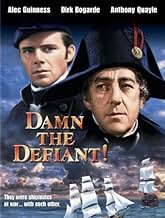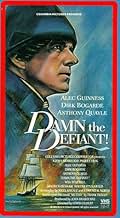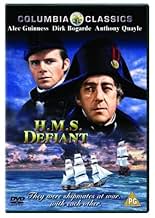Agrega una trama en tu idiomaOn the H.M.S. Defiant, during the French Revolutionary War, fair Captain Crawford is locked in a battle of wills against his cruel second-in-command Lieutenant Scott-Padget, whose heavy-hand... Leer todoOn the H.M.S. Defiant, during the French Revolutionary War, fair Captain Crawford is locked in a battle of wills against his cruel second-in-command Lieutenant Scott-Padget, whose heavy-handed command style pushes the crew to mutiny.On the H.M.S. Defiant, during the French Revolutionary War, fair Captain Crawford is locked in a battle of wills against his cruel second-in-command Lieutenant Scott-Padget, whose heavy-handed command style pushes the crew to mutiny.
- Dirección
- Guionistas
- Elenco
- Dirección
- Guionistas
- Todo el elenco y el equipo
- Producción, taquilla y más en IMDbPro
Opiniones destacadas
The story itself is based very, very loosely upon various mutinies and strikes that occurred in 1797 aboard British war ships. In the film, crew members were pushed to do this desperate act due to their sadistic treatment at the hands of some of the officers (in particular, Dirk Bogarde's character). However, in reality, the strikes and mutinies occurred for far less noble reasons--such as for higher pay or to spread the spirit of the French Revolution to the British navy. Still, despite this discrepancy, the film is top entertainment.
The film begins with the Captain (Alec Guinness) preparing to return to sea with his very young son on board his first assignment. While Guinness seems like a decent sort of man, you immediately are taken aback by the violent press gangs that secure replacement crew members by kidnapping hapless Brits. In addition, once the cruise begins, you can't help but hate Bogarde as the second in command. While he is competent, he's also a sadist and power-hungry. Again and again, he ignores the Captain's orders and abuses the crew--pushing the men to the breaking point. While the Captain is no wimp, Bogarde finds ways to assert himself without doing enough to merit his arrest--at least until late in the film.
The acting by Guinness and Bogarde is awfully good and makes the film. Bogarde does a great job of playing an evil bully, though the most kudos should go to Guinness, as his character has a lot of depth--making this one of his better film roles. However, this is no surprise as he was a wonderful actor and had an astounding skill at immersing himself into a very wide range of characters--and doing it in a very believable and understated way. Interestingly enough, this film was very quickly made (so that Guinness could get back to filming LAWRENCE OF ARABIA) but you sure can't tell that from his performance. In addition, the supporting actors really did an excellent job and I have no real complaints about anything in the film--a rarity for a picky guy like me.
Exceptional throughout and quite gripping--this film is tough not to like and will keep you on the edge of your seats.
Dramatic film with impressive battle of wills between humane Captain Crawford in command of the warship HMS Defiant perfectly performed by Alec Guinness against his first officer, the sadistic and supercilious first lieutenant , splendidly interpreted by Dick Bogarde . Authenticity is the hallmark of this breathtaking adventure along with awesome acting , spectacular warships and overwhelming sea battles . Production design , gowns and ambient show great attention to period detail . The support cast performances by all concerned are superb as Maurice Denham as Mr. Goss , Nigel Stock as Senior Midshipman Kilpatrick , Richard Carpenter as Lieutenant Ponsonby ,Peter Gill as Lieutenant D'Arblay ,David Robinson as Midshipman Harvey Crawford , Robin Stewart as Midshipman Pardoe , Ray Brooks as Hayes , and specially Anthony Quayle as Vizard . Very good cinematography in Cinemascope by Christopher Challis and evocative score by Clifton Parker . The motion picture was well directed by Lewis Gilbert .
The flick was inspired on actual events as ¨The mutiny at Spithead¨ in 1797. Sailors on 16 ships in the Channel Fleet, commanded by Admiral Lord Bridport, protested against the living conditions aboard Royal Navy vessels and demanded a pay raise. Seamen's pay rates had been established in 1658, and because of the stability of wages and prices, they were still reasonable as recently as the 1756–1763 Seven Years' War . The Royal Navy had not made adjustments for any of these changes, and was slow to understand their effects on its crews. Finally, the new wartime quota system meant that crews had many landsmen from inshore, who did not mix well with the career seamen , leading to discontented ships' companies. The mutineers were led by elected delegates and tried to negotiate with the Admiralty for two weeks, focusing their demands on better pay , and the removal of a handful of unpopular officers; neither flogging nor impressment was mentioned in the mutineers' demands. The mutineers maintained regular naval routine and discipline aboard their ships , allowed some ships to leave for convoy escort duty or patrols, and promised to suspend the mutiny and go to sea immediately if French ships were spotted heading for English shores.Because of mistrust, especially over pardons for the mutineers, the negotiations broke down, and minor incidents broke out, with several unpopular officers sent to shore and others treated with signs of deliberate disrespect. When the situation calmed, Admiral Lord Howe intervened to negotiate an agreement that saw a Royal pardon for all crews, reassignment of some of the unpopular officers and a pay raise . Afterward, the mutiny was to become nicknamed "breeze at Spithead".
Denis Maternovsky
The Defiant sets sail from the naval harbor at Spithead just before the ships of the Channel Fleet are ready to start an organized mutiny. So with no contact between them and the ships at Spithead or in the Mediterranean, the men of the Defiant have to work out their own course of action. That action is the basis for what happens.
They've got an unwitting ally in the ship's executive officer, Scott- Padget played by Dirk Bogarde. A future Drake or Hawkins with influence and a taste for sadism. He looks to usurp the authority of Captain Crawford who is played by Alec Guinness. The conflict between them plays into the hands of the mutineers.
In that other famous story of the sea, Mutiny on the Bounty, Fletcher Christian points out to Captain Bligh that the men drafted into the Royal Navy from the press gangs aren't king and country volunteers. Neither are these people in the foc'sle of the Defiant.
Bogarde plays against type and does it well. He's usually not a villain in film although he had essayed villainous roles before in his career. But Guinness is a wonder. His Captain Crawford, calm, detached, and inspiring in his own way in his patriotism was a role Alec Guinness could be proud of. Totally different than the characters he played in those Ealing studio comedies. This falls more in line with Colonel Nicholson in The Bridge on the River Kwai or Colonel Sinclair in Tunes of Glory without the bad character features the other two had.
Great Britain eventually stopped using press gangs, but at the time it was the way the Royal Navy got a crew together. In fact later on during the Napoleonic Wars, the British took to stopping American ships and impressing members of those crews in the Royal Navy. It was one of the causes of the War of 1812.
Two other performances in H.M.S. Defiant are worthy of note. Anthony Quayle as the mutiny leader on the Defiant and Tom Bell one of the mutineers whose rashness nearly blows it all for the seamen and their cause.
Hovering over all of this is the French and to me the highlight of the film is Alec Guinness reminding the men of their duty to prevent a French invasion of their island home. It's a superb piece of drama.
A little Mutiny on the Bounty, a little Horatio Hornblower go into the plot of H.M.S. Defiant. It's a good mix with a superb group of players serving it up for the audience.
The ship is led by Captain Crawford (Alec Guinness), a fair man who is afraid to rattle the cage of his next in command, the sadistic Lieutenant Scott-Padget (Dirk Bogarde), who is well-connected and has ruined the careers of previous captains.
The ambitious Scott-Padget, however, is determined to take over the ship and wants things his way. To this end, he brutalizes Crawford's young son, who is on board as a midshipman, knowing that the principled Crawford will not interfere.
However, there are mutineers on board, led by Vizard (Anthony Quayle) who have written a petition for better food and more money. They hate Scott-Padget, and if they take control, he's in big trouble.
This is a very good film with suspense as well as excitement, dominated by the acting of Guinness and Bogarde. Guinness is brilliant - you can see him making an effort to control his anger, and one also sees his great pain. When he at last asserts himself, he is very noble.
Director Gilbert had to fight for Bogarde, so devalued was he by Hollywood, but Guinness spoke up for the actor as well, and he was cast. He does a great job - handsome, outwardly polite, and mean as dirt. Anthony Quayle is excellent as Vizard, who, in leading his men, demands patience.
Absorbing and entertaining, even if movies on the high seas aren't your thing.
¿Sabías que…?
- TriviaSir Alec Guinness and Sir Anthony Quayle made this movie during the two-month break in the shooting of Lawrence de Arabia (1962), when the production moved from Jordan to Spain. Upon finishing this movie, both returned to Lawrence of Arabia (1962).
- ErroresIn the last scene, Sir Alec Guinness orders all larboard (port side) guns to bear on the fire ship. In the next shot, the starboard cannon fire. Ironically, the term "larboard" was changed by the navy into the current term "port" precisely because it was too easy to mistake it for starboard.
- Citas
Lieut. Scott-Padget: [Scott-Padget turns back to the Captain as he begins to exit] You may have the power of life and death over every man about this ship, sir, but I warn you: if we come through this voyage safely...
Captain Crawford: [Crawford looks up from his work] Yes? If?
Lieut. Scott-Padget: To have followed Admiralty instructions may not be quite be enough.
Captain Crawford: [Crawford smacks his desk, jumps up and approaches Scott-Padget] I will say this to you only once, sir: I will not be bullied or threatened and I intend to be obeyed! Your friends in London mean nothing to me! I assure you that while you serve aboard this ship, they will mean absolutely nothing to you! You can go now.
- Créditos curiososOpening credits prologue: SPITHEAD, ENGLAND 1797
- ConexionesFeatured in Bequest to the Nation (1973)
Selecciones populares
- How long is Damn the Defiant!?Con tecnología de Alexa
Detalles
- Fecha de lanzamiento
- País de origen
- Idiomas
- También se conoce como
- Damn the Defiant!
- Locaciones de filmación
- Denia, Alicante, Comunidad Valenciana, España(Spanish coast)
- Productoras
- Ver más créditos de la compañía en IMDbPro
- Tiempo de ejecución1 hora 41 minutos
- Color
- Relación de aspecto
- 2.35 : 1
Contribuir a esta página



































